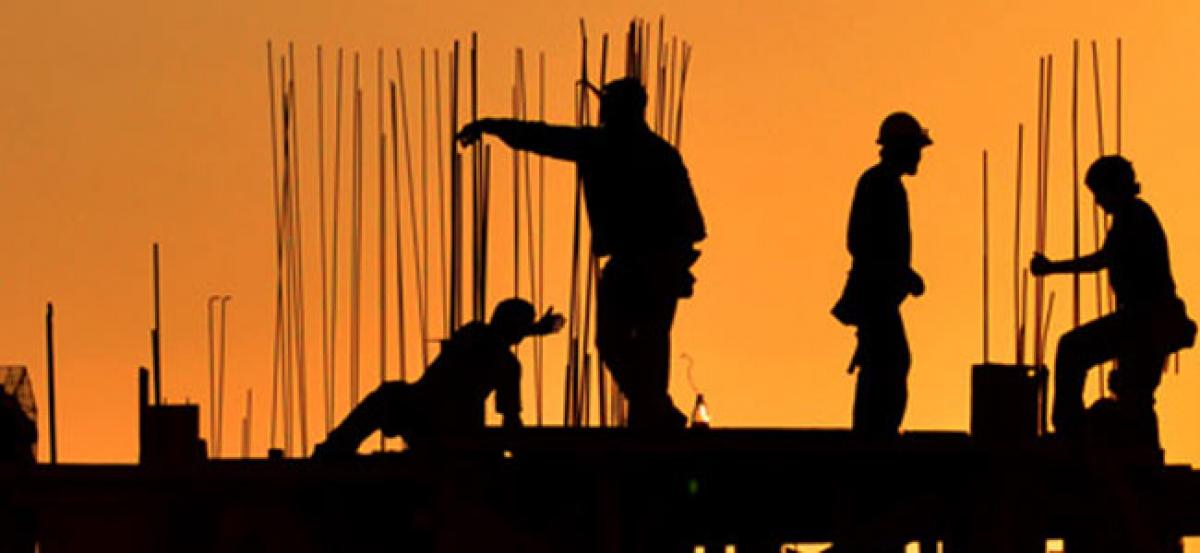Live
- Actor Darshan’s bail plea in fan murder case adjourned to Oct 8 (Lead)
- Ghee supplied for Tirupati laddus not made at TN dairy, reveals document
- Nitish Kumar announces 10 lakh jobs in next one year
- Football: Juventus ‘will decide’ Paul Pogba’s future, says Thiago Motta
- Kerala: PV Anvar still undecided on joining DMK or NCP-SP
- Women’s T20 WC: Indian team will learn a lot and come back stronger, says Poonam Yadav
- Women’s T20 WC: Harmanpreet has been more successful at four or five, says Poonam
- Bank credit grows by 15 pc in August in India, agriculture and industry pick up
- Natasa Stankovic spotted shooting for a song in Chandigarh
- Venkat Set for a Grand Comeback with ‘Harudu - The Destroyer’ as a Fearless Police Officer
Just In

The NDA government eagerly waits for the next report of ‘Ease of Doing Business’ rankings by World Bank to ascertain how many ranks India has progressed.
The NDA government eagerly waits for the next report of ‘Ease of Doing Business’ rankings by World Bank to ascertain how many ranks India has progressed. India is ranked at a lowly 130th rank among 189 countries surveyed. It jumped 12 ranks in the last two years. Pakistan, whom Indians loathe as a failed state, is at 138th place breathing down on India's neck.
Over 7,000 steps, big and small, have been taken by the government so far to improve the ease of doing business in the country, Commerce and Industry Minister Nirmala Sitharaman said recently. The steps have yielded just 12 ranks improvement ! The government needs to take at least a lakh of more steps to bring India in the top 50 bracket.
Over the years, battle-hardened business men have found that India could be the easiest place to do business if you grease the hands of middlemen, bureaucrats and politicians. They never worried about India's rank in ‘Ease of Doing Business’ ranking.
Unless, the Modi government takes hard steps to eradicate the deep-rooted corruption in the system and carry out big ticket structural reforms like labour reforms, land reforms, judicial reforms etc., India can never aspire to reach the top bracket on the ease of doing business index.
India is ranked almost at the lowest rank at 178 in the parameter of enforcing contracts. This calls for broad-based reforms in contract and arbitration laws and in the working of enforcement agencies and judicial process. Even more depressing is India's rank of 183 for dealing with construction permits.
Here, mostly the state government agencies and local bodies are the ones which grant permits. The Centre should find ways to eradicate corruption by employees and interference by netas and local bodies and ensure transparency and accountability in the process.
Ease of Doing Business is just one of the factors that influence investments into the country. Other factors are growth rate of country, optimistic outlook of future, a general feel good factor etc. The Economic Reforms of 1991 carried out by late Prime Minister P V Narasimha Rao expanded India's services sector and broad-based India's manufacturing sector through a liberalised investment and trade regime and eradication of licence raj.
In turn, India's GDP growth rate has decisively moved above the Hindu rate of growth (sub 5%) during the last 25 years. India's GDP grew at an impressive 7.7% during the 10 years of UPA regime and at 6.2% in the earlier decade.
After 1991, no government has carried out any major structural reforms. India’s GDP growth rate slowed to 6.1% in the fourth quarter of 2016-17 from 7% in the preceding quarter, due to impact of demonetisation on many key sectors of economy.
Q4 GDP growth rate slowed to its lowest level in more than two years, dragged down by construction & manufacturing sectors and stripping India of its status as the world's fastest growing major economy. India’s per capita income in real terms in 2016-17 also slowed down to a growth pace of 5.7% to Rs 82,296 against 6.8% growth recorded during last year.
An analysis of job creation in the non-farm sectors, based on quarterly employment surveys (QES) data, shows that while the rate of job creation in the two-year period of 2011-12 and 2012-13 of UPA-2 was 7,40,000 per year, it was just about 2,70,000 in the period 2014-15 and 2015.16 and hence the rate of job creation in India has contracted sharply by 64 per cent post Modi government.
Lack of private investment is primarily responsible for pulling down employment growth and GDP growth rate. In perspective, NDA government has inherited a bad-debt ridden banking system from UPA government, leading to slower bank credit and investments. Lack of private sector investments are partially made up by increased government spending in infrastructure projects.
The Pradhan Mantri Awas Yojana, Smart City project etc are well thought schemes to meet the deficit in housing and urban amenities and in turn create employment to meet these needs. However, they have not yet shown any visible impact on employment due to lackadaisical pace of implementation of these schemes.
Now-a-days the government prefers to articulate its achievement and country's progress, not in terms of employment generated or increase in per capita income, but in terms of increase in number of digital transactions and reduction in number of cash transactions.
Digital economy and tax compliance will obviously make the facade for a modern country. But employment, communal harmony and well being of farmers etc are need of the hour to make the foundation of the country long-lasting.
By V Venkateswara Rao

© 2024 Hyderabad Media House Limited/The Hans India. All rights reserved. Powered by hocalwire.com







